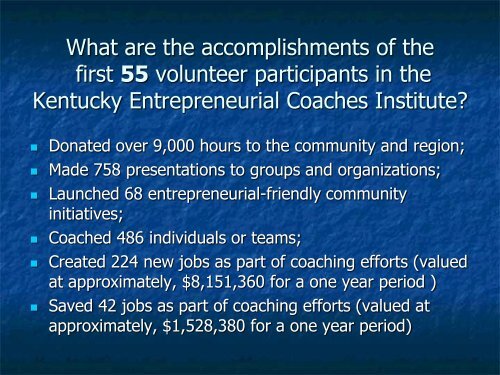New Product Development and Commercialization
New Product Development and Commercialization
New Product Development and Commercialization
You also want an ePaper? Increase the reach of your titles
YUMPU automatically turns print PDFs into web optimized ePapers that Google loves.
What are the accomplishments of the<br />
first 55 volunteer participants in the<br />
Kentucky Entrepreneurial Coaches Institute?<br />
• Donated over 9,000 hours to the community <strong>and</strong> region;<br />
• Made 758 presentations to groups <strong>and</strong> organizations;<br />
• Launched 68 entrepreneurial-friendly community<br />
initiatives;<br />
• Coached 486 individuals or teams;<br />
• Created 224 new jobs as part of coaching efforts (valued<br />
at approximately, $8,151,360 for a one year period )<br />
• Saved 42 jobs as part of coaching efforts (valued at<br />
approximately, $1,528,380 for a one year period)
But the biggest accomplishment<br />
is the transformation of<br />
entrepreneurial culture<br />
• Over 68 entrepreneurial-friendly community<br />
initiatives have been launched including youth<br />
entrepreneurship in schools, entrepreneurial<br />
contests, new networks, incubators in rural<br />
areas, entrepreneurial help centers in rural<br />
libraries.<br />
• . . . <strong>and</strong> a tight network of 115 volunteer grassroots<br />
leaders who are committed to<br />
strengthening entrepreneurship in the region.
Questions from<br />
Government Leaders:<br />
Why Is Northeastern Kentucky Not<br />
Entrepreneurial?<br />
Why Don’t They Come Up with Innovative Ideas<br />
<strong>and</strong> Apply for Entrepreneurial Grants?
My Research<br />
Questions:<br />
What do local<br />
leaders know about<br />
entrepreneurs?<br />
What is the<br />
capacity of local<br />
people to support<br />
entrepreneurs <strong>and</strong><br />
innovators?<br />
Methodology: Focus<br />
groups <strong>and</strong><br />
surveys in region.
North Eastern Kentucky
What I Learned From My<br />
Research In Region?<br />
‣ Lack of community support for “new ideas” or<br />
entrepreneurship;<br />
‣ Lack of regional identity: focus on local counties;<br />
‣ Lack of grass-roots entrepreneurial leaders <strong>and</strong> coaches;<br />
‣ Limited underst<strong>and</strong>ing of resources for entrepreneurs;<br />
‣ Limited networking among “natural” coaches,<br />
entrepreneurial leaders <strong>and</strong> advocates;<br />
‣ Lack of training for local leaders to promote advocates <strong>and</strong><br />
leaders in entrepreneurship;
Conclusions from Research<br />
We can build on hidden entrepreneurship<br />
in the region;<br />
We an build on strengths of grass-roots<br />
leaders in region to nurture an<br />
entrepreneurial culture;<br />
We can create a sense of regional identity<br />
<strong>and</strong> foster an entrepreneurial support<br />
network.
Next Step:<br />
• What are the skills, knowledge <strong>and</strong><br />
attitudes we want to nurture among<br />
grass-roots leaders in the region?<br />
• Responses came from rural<br />
entrepreneurship experts in nation <strong>and</strong><br />
from almost 200 people who live in the<br />
region.
Skills <strong>and</strong> Knowledge<br />
• Imagination; Creativity;<br />
• Underst<strong>and</strong>ing of entrepreneurial cultures;<br />
• Ability to see potentials where others see<br />
problems;<br />
• Ability to listen;<br />
• Ability to ask probing questions;<br />
• Ability to develop a strong network of<br />
emotional <strong>and</strong> informational support.
Skills <strong>and</strong> Knowledge (2)<br />
• Ability to coach entrepreneurs across the<br />
kitchen table; practical experience in<br />
helping entrepreneurs;<br />
• Ability to advocate for entrepreneurs in an<br />
indifferent political <strong>and</strong> cultural climate;<br />
• Ability to mobilize others;<br />
• Ability to build a regional network of<br />
entrepreneurial leaders <strong>and</strong> advocates;
Attitudes<br />
• Entrepreneurial cultures can be<br />
strengthened;<br />
• Build on local strengths <strong>and</strong> assets;<br />
• Regional entrepreneurial identity can<br />
emerge;<br />
• NE Kentucky can become one of the most<br />
entrepreneurial-friendly cultures in rural<br />
America.
Next Conclusion<br />
from Regional Discussions<br />
• A critical mass of entrepreneurial leaders<br />
can be trained to make a difference;<br />
• Start an entrepreneurial leadership<br />
program to nurture 60 grass-roots leaders<br />
who will lay the foundation for an<br />
entrepreneurial culture.
“The future of every community lies<br />
in capturing the passions,<br />
imagination <strong>and</strong> resources of its<br />
people”<br />
--Ernest Sirolli, author<br />
“Ripples from the Zambezi”
A proposal was developed for<br />
the Kentucky Entrepreneurial<br />
Coaches Institute
Objectives of KECI<br />
Objective #1.<br />
To establish a<br />
tightly knit<br />
network of 60<br />
entrepreneurial<br />
coaches <strong>and</strong><br />
leaders across the<br />
19 tobaccodependent<br />
county<br />
region.
Objective #2.<br />
To facilitate the emergence<br />
of a strong entrepreneurial<br />
culture or support system<br />
in the targeted region.
Objective #3.<br />
To strengthen the<br />
entrepreneurial<br />
infrastructure in the region.
Entrepreneurial Leaders <strong>and</strong><br />
Coaches are:<br />
‣ Well-trained volunteer lay leaders<br />
from across the region<br />
‣ Selected in a competitive process<br />
‣ A diverse class (gender, race,<br />
age, income <strong>and</strong> educational<br />
levels, work background)<br />
‣ 2/3 have some involvement with<br />
agriculture
The Curriculum:<br />
‣ Eight seminars across the region over 16<br />
months;<br />
‣ International or national seminar<br />
- We’re not alone!<br />
- How other rural areas compete<br />
- Importance of globalization<br />
‣ A multi-method, h<strong>and</strong>s- on approach:<br />
* Interaction with international experts<br />
* Panel discussions <strong>and</strong> break-out sessions<br />
* Visits to entrepreneurs<br />
* Showcases of creative regional entrepreneurs;<br />
* H<strong>and</strong>s-on “homework” assignments<br />
* Mini Grants for practical experience to build<br />
regional cooperation
Program Phase: Building a Network of<br />
Entrepreneurial Leaders Across the Region<br />
Class I: 2004-2005<br />
- 30 lay leaders from across the region selected<br />
Class II: 2005-2006<br />
- 30 lay leaders from across the region selection<br />
After Graduation:<br />
- Alumni Network: Sustaining the network<br />
- Volunteer Commitments<br />
Class III <strong>and</strong> Class IV Expansion in Years Ahead
It’s about entrepreneurship in a community<br />
development context<br />
‣ Entrepreneurship = innovation in social <strong>and</strong> business<br />
enterprises.<br />
‣ Community development = building or increasing<br />
solidarity <strong>and</strong> agency.
Is the Kentucky Entrepreneurial<br />
Coaches Institute based on social<br />
science theory or is it just intuition <strong>and</strong><br />
assumptions?
Social Capital Theory<br />
‣ It’s about relationships<br />
‣ Social action is fostered through trust, friendships,<br />
willingness to share resources.<br />
‣ Reciprocity – not quid pro quo.<br />
‣ Bonding + bridging social capital<br />
‣ Practice: sharing rooms, buses, planes <strong>and</strong><br />
mini-grant experiences.
Concerns About Structure Functionalism<br />
(systems theory)<br />
‣ Related to agency (capacity building)<br />
‣ Structures have manifest <strong>and</strong> latent functions.<br />
‣ Structures contribute to own maintenance.<br />
‣ Practice: Build capacity of community to<br />
focus on entrepreneurship.<br />
Talcott Parsons
Concerns About Power: Power & Conflict Theories<br />
‣ Weak areas dependent on “core.”<br />
‣ Power more diffused among contending<br />
interest groups;<br />
‣ Conflict is integral to social life.<br />
‣ Practice: Analyze why differences with<br />
elected political leaders about entrepreneurship<br />
Know how to advocate for<br />
entrepreneurship.
Concerns About Shared Meaning: Symbolic<br />
Interactionism<br />
‣ Human Interaction is About Symbols<br />
(Language, Meaning to Places, People & Events)<br />
‣ Shaped by one who makes gesture <strong>and</strong> recipient.<br />
Observe, imitate, question.<br />
‣ Practice: Building shared vision about<br />
entrepreneurship <strong>and</strong> what it means.<br />
Herbert Blumer
How We Talk: Communicative Action Theory<br />
‣ Habermas – communication shaped at the seam of a<br />
system <strong>and</strong> life world (the everyday world of<br />
language <strong>and</strong> culture).<br />
‣ Science + technology are modi oper<strong>and</strong>i but not<br />
value-free.<br />
‣ Three kinds of knowledge: technical, hermeneutic<br />
<strong>and</strong> emancipatory.<br />
‣ Practice: Integrate technical knowledge<br />
with other two kinds of knowledge<br />
in workshops; Mini-grant experiences.<br />
Jürgen Habermas
Rational Choice Theory<br />
‣ Rational humans choose alternatives that best<br />
suit individual needs.<br />
‣ About incentives or sanctions.<br />
‣ Those free of personal constraints attracted to<br />
social movements.<br />
‣ Practice: Elevate status of Fellows; use time<br />
wisely; clear expectations
Giddens Structuration Theory<br />
‣ Links disparate macro theories with micro theories.<br />
‣ Modalities = certain paths or norms available through cultural<br />
patterns. Modalities can transform or reinforce status quo. Link<br />
among structure, symbolic interactionism, rational choice <strong>and</strong> other<br />
theories.<br />
‣ Practice: Creativity <strong>and</strong> innovation are an integral part of our<br />
democracy <strong>and</strong> capitalist system. Can be used to challenge status<br />
quo.
Conclusion: Seven Key Theories Underpinning<br />
Kentucky Entrepreneurial Coaches Institute<br />
‣ Social Capital Theory<br />
‣ Structural Functionalism<br />
‣ Power <strong>and</strong> Conflict Theory<br />
‣ Shared Meaning – Symbolic Interactionism<br />
‣ Communicative Action Theory<br />
‣ Rational Choice Theory<br />
‣ Giddens’ Structuration Theory

















